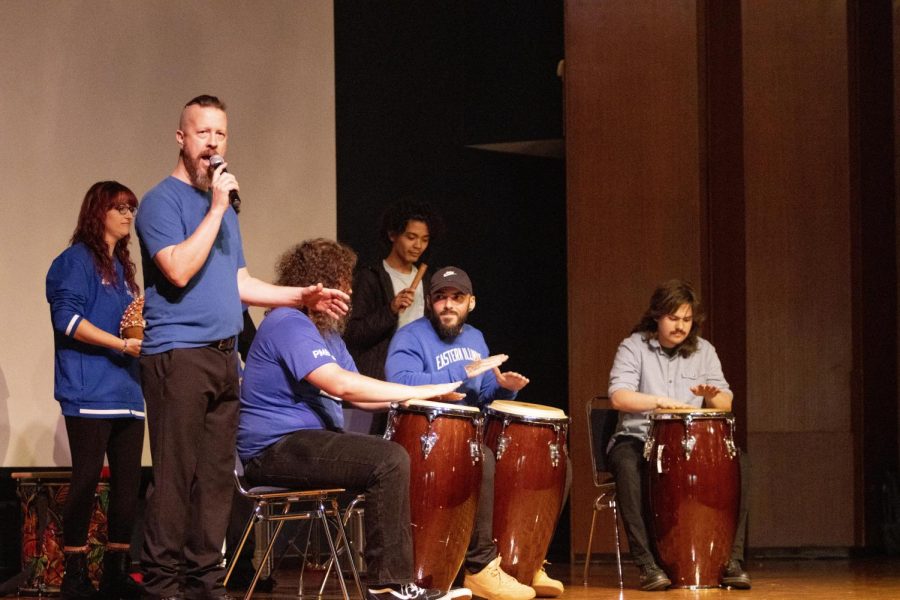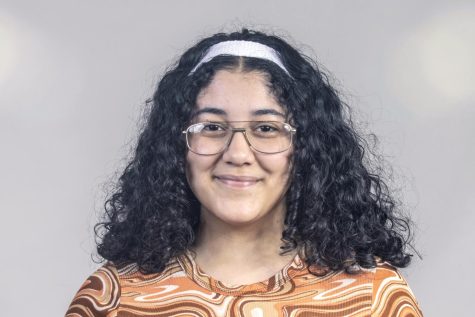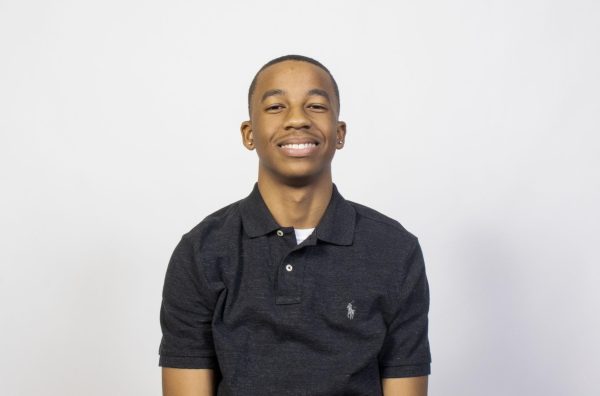Percussionists dream to teach music to next generation
The percussionist part of the Panther Marching Band perform two different pieces, the first from Cuba, and the second from Brazil, at the Dia De Los Muertos Gala.
November 9, 2022
Percussion instruments come in many different shapes and sizes, creating very different sounds. From the booming sound of a bass drum to the tinkling sound of a triangle, there is a lot of diversity in the sorts of sounds one can hear from the percussion family.
Percussionists in concert bands and orchestras often have to learn to play multiple instruments in one piece of music, keeping the rhythm and supporting a piece with a variety of unique sounds.
These versatile performers can be seen in many of Eastern’s own ensembles, including the Panther Marching Band, the EIU Percussion Ensemble and the EIU Jazz Ensemble.
One such student performer is Garrison Reed, a junior music education student. He said that percussion instruments are an important part of bands.
“It’s such an important part of bands because of how expressive it can be,” Reed said. “It adds extra weight and impacts to important parts and adds extra color to a piece that other instruments necessarily can’t do.”
Reed said that music has always been a big part of his family, having many family members that played instruments, including both of his parents who were in band in high school.
“I was already really interested in playing an instrument, but in the mind of a sixth grader, drums sounded cool and the idea of playing percussion in general just intrigued me,” Reed said. “I’d seen other bands that had come through on tours to the elementary school at the time, and everyone in the back looked like they were having a blast playing in the percussion section. I just kinda knew I belonged there.”
Despite finding an early passion for music, Reed said he had no clue he was going to pursue a career in music, but that passion led him to studying music at Eastern.
Alex Drews, a graduate student concentrating in percussion performance, also found an early passion for music.
“My mom always tells me that I started young just banging on pots and pans and stuff in the kitchen when I was a young kid,” Drews said.
Drews said he was drawn to playing percussion instruments because of the versatility of instruments, and how they can be used.
“You can be playing very heavy in a rock and roll band or playing a very delicate triangle in an orchestral piece,” Drews said. “There’s so many ways they can be utilized, and unlike any other instrument, I would say, there are so many different instruments to master. It’s kind of like a challenge, like how many can you get.”
Drews said that growing up, he got involved in music ensembles, and that allowed him to work with band directors and private music teachers that had a passion for playing instruments.
“People being passionate about an instrument is very infectious, so it also sparked that in me,” Drews said. “That’s probably why I decided, because of the influence of my teachers and just how fun it is.”
Drews said that because his teachers were a huge influence on him, he would like to be a teacher someday and share his passion for music with his students.
“I want to learn as much of it as possible and then go off and share it with whoever’s interested,” Drews said.
Reed said he was also inspired by his teachers, specifically his band director and history teacher, to pursue a career in music education.
“Watching what [my history teacher] did and what my band director did for not only me, but all his other students he had, it finally clicked with me that this is what I was meant to do,” Reed said. “I wanted to be a teacher and not only teach something that I’m passionate about, but try to break the stigma behind teaching in general.”
Reed said that he often heard people say that those who can’t do, teach, and he wants to break that stigma.
“We don’t do it because we can’t do anything else, it’s because we want you to be as good as the greats in your field,” Reed said.
There are not only misconceptions about music teachers, but also about percussionists in general.
“There’s a lot of big misconceptions about the percussion world, especially when it comes to drums or the drum set,” Reed said. “The biggest ones being, ‘Oh you just hit stuff’ or ‘Drummers aren’t musicians’ or even ‘Drummers are stupid.’”
Drews said that percussion instruments are ones where “you’re doing something very simple looking, but there’s so many nuances into what you’re actually doing.”
“On the outside, it can seem like I’m just hitting these big drums, but I’m actually making highly calculated decisions,” Drews said. “What we do can seem simplistic, but it’s actually hard to make it sound good rather than just banging on drums.”
Reed said that it can be challenging to master techniques needed for every percussion instrument and that the “finest details matter to create the most beautiful sounds you can from that instrument,” especially when you have to learn how to play multiple instruments.
He said that his professors and band directors at Eastern have helped him a lot on his journey as a percussionist.
“My professor has done a lot that’s helped me as far as becoming a better musician and helping make my weaknesses much stronger on instruments I’m not as strong on and getting even better at the ones I know well,” Reed said. “The same could also be said for both of our band directors we have here. They’ve really pushed me to become a better musician and I couldn’t be happier with the work I do here.”
Kyara Morales-Rodriguez can be reached at 581-2812 or at [email protected].




















































